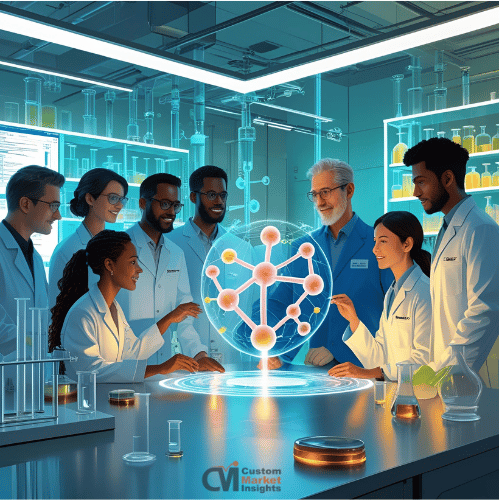Introduction: AI Reshaping the Future of the Chemical Industry
AI is no longer just a sci-fi theory; it’s now a game-changer in several areas, such as chemistry. As the need for new ideas, efficiency, and sustainability develops, AI is becoming more and more important in modernizing chemical manufacturing, research, and supply chain activities. AI is altering the way chemical companies do business and compete in numerous ways, including predictive maintenance, smart formulation design, making materials that are just right for a job, and lowering risk.
A new report from CMI says that the use of AI in the chemical industry will grow at a rate of 24.3% per year until 2030. Businesses that employ AI-powered solutions can expect to see their productivity go up by as much as 30% and their research and development costs go down a lot.
AI in Research and Development: Speeding Up the Search for Molecules
Chemical research and formulation development used to cost a lot of time and money. AI algorithms can now look at millions of chemical combinations in a fraction of the time it would take human researchers. When looking for new materials, polymers, catalysts, or pharmaceutical formulations, this talent cuts down on the trial-and-error phase by a lot.
According to a CMI analyst, “AI is fundamentally changing the chemistry lab.” Machine learning algorithms can now properly predict the properties of molecules. This cuts the time it takes to undertake research and development by years.
For instance, huge chemical industries are employing generative AI to produce plastics that break down in the environment, flame-resistant materials, and coatings that work well. AI also enables scientists to model complicated reactions to learn about behavior without having to undertake real testing, which saves time and money.
AI is used in manufacturing in things like smart plants and predictive operations:
AI lets you watch and control what happens at a chemical plant in real time. With the use of current sensors, IoT devices, and machine learning algorithms, manufacturers can make everything from energy use to batch yields better. Predictive maintenance is another important change. AI systems look at data about equipment to estimate when it will break down before it occurs. This cuts down on unplanned downtime and maintenance costs.
Table: AI Applications in Chemical Manufacturing and Their Benefits
| Application Area | AI Use Case | Benefits |
| Process Optimization | Real-time analysis of variables | Improved yield, reduced energy consumption |
| Predictive Maintenance | Early detection of equipment issues | Lower downtime, reduced repair costs |
| Quality Control | AI vision for defect detection | Higher product quality, minimal waste |
| Safety & Compliance | AI monitoring of hazardous conditions | Enhanced worker safety, regulatory adherence |
According to CMI’s digital transformation study (2025), companies that adopted AI-enabled predictive analytics reported a 22% increase in production efficiency and a 19% reduction in operational costs within two years of implementation.
Supply Chain Optimization: Tackling Disruption with Intelligence
The chemical industries worldwide supply networks have never been more disrupted than they are now, thanks to the COVID-19 epidemic, geopolitical tensions, and the price of raw materials going up and down. AI can help these networks become more resilient and open, which they need.
AI tools can look at huge amounts of data to figure out what people will want, how to best use inventories, how much raw materials will be needed, and what hazards might come up before they get worse. Chemical businesses are also utilizing AI to check on the performance of suppliers, the timing of shipments, and the operations of warehouses. This helps make the buying and selling processes go more smoothly.
A CMI analyst says, “AI-driven supply chain platforms are helping chemical manufacturers become more flexible and proactive in today’s uncertain environment.” Using smart forecasting and tracking in real time is increasingly becoming the norm in business.
AI and Sustainability: Pushing Eco-Innovation
The chemical sector puts a lot of emphasis on sustainability, and AI is proving to be an essential tool for making processes more environmentally friendly. AI can predict how a product or procedure will affect the environment before it is put into use. This lets chemists and engineers make environmentally friendly design choices early in the development process.
AI is also used to keep an eye on pollutants, make the most of water and energy utilization, and cut down on waste on production lines. Many businesses are employing AI to make low-carbon versions of basic chemicals and materials, which helps the circular economy.
AI is helping the switch to bio-based feedstocks by predicting how new biological inputs will act in chemical processes that are already in use. These innovative ideas speed up the shift toward industrial methods that are good for the environment and use renewable resources.
Bridging the Gap: Problems with AI Adoption
Even if AI has several benefits, it is not easy to use in the chemical business. Data quality and getting old systems to work together are still big problems. A lot of businesses have trouble standardizing and centralizing the data they need to use AI effectively. There aren’t enough skilled workers who know both AI and chemical processes, either.
CMI suggests a step-by-step plan: begin with pilot initiatives in research and development or plant monitoring, expand successful use cases, and fund training programs that bring together people from different fields. To have the most impact, AI experts, chemical engineers, and data scientists need to work together openly.
Case Studies and Success Stories That Show Real-World Impact
- BASF is utilizing AI to model and test catalysts, which cuts research time in half.
- Dow has used machine learning models to guess how many customers will want its products and make production schedules more efficient. This has led to a 15% increase in efficiency.
- LANXESS uses AI to keep an eye on water treatment, which means more precise dosing and less use of chemicals.
These examples show how chemistry and computation are coming together more and more and how AI could be a key differentiator.
The Rise of Cognitive Chemistry: What Will Happen Next
“Cognitive Chemistry” is a new idea that says AI systems will not only help but also generate new chemical advances. CMI says that by 2035, AI-based platforms will help find or improve about 40% of new chemical compounds.
As rules get stricter, supply networks get more complicated, and customer needs change, AI will play a bigger role in making strategic decisions in the chemical industry. The next phase of chemical innovation will be led by companies that see AI as more than just a tool.
AI is not taking the place of chemists; it is giving them more authority, says a CMI Senior Analyst. This combination of human knowledge and computer intelligence will change what is achievable in chemistry.
Final Thoughts
The chemical industry is getting a brighter, faster, and more sustainable future thanks to artificial intelligence. AI is making changes that have never happened before, from the lab bench to the factory floor to the logistical chain. Companies that put money into AI capabilities now will not only get an edge over their competitors, but they will also change the course of the global chemical market for many years to come.
Connect with our Experts


